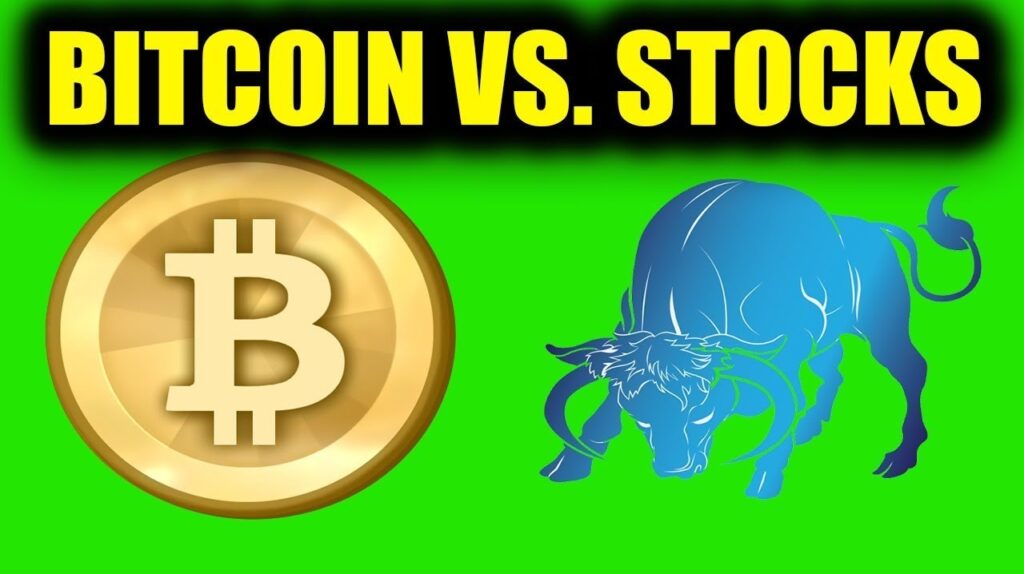
Investing is no longer just a financial strategy—it’s a life skill. But with choices like Bitcoin and the stock market dominating headlines, how do you decide where to put your hard-earned money? Let’s break down both options to help you choose wisely, based on your goals, risk appetite, and market understanding. Whether you’re saving for retirement, looking to build wealth, or seeking quick gains, understanding the fundamentals of each option is crucial. The right investment path not only grows your money but also aligns with your long-term financial vision and lifestyle.
Understanding the Basics
What is Bitcoin?
Bitcoin is a decentralized digital currency powered by blockchain technology. Created in 2009 by an unknown entity known as Satoshi Nakamoto, it was designed as an alternative to fiat currencies, free from government control. Transactions are verified by network nodes through cryptography, making it highly secure and transparent. Over the years, Bitcoin has evolved into a popular store of value and a speculative investment asset worldwide.
Key Characteristics of Bitcoin:
- Decentralized: No central authority or bank controls it.
- Scarce Supply: Capped at 21 million coins.
- Borderless Payments: Enables fast global transfers.
- Highly Volatile: Subject to sharp price swings.
- Security via Blockchain: All transactions are recorded on a transparent ledger.
Quick Tip: “Never invest in Bitcoin without first securing your digital wallet and understanding how private keys work.”
What is the Stock Market?
The stock market is a regulated marketplace where shares of public companies are bought and sold. Investors earn returns through capital appreciation and dividends. It plays a vital role in the economy by enabling companies to raise capital for growth and innovation. With various investment instruments like ETFs, mutual funds, and bonds, it offers diverse opportunities for both short-term and long-term investors.
Key Characteristics of the Stock Market:
- Regulated & Transparent: Overseen by organizations like the SEC (USA) and SEBI (India).
- Ownership-Based: Buying a stock means partial ownership in a company.
- Income Potential: Some companies pay regular dividends.
- Diversified Options: Includes sectors like tech, healthcare, finance, etc.
- Stable Over Time: Historically delivers steady long-term returns.
Bitcoin vs Stock Market: A Side-by-Side Comparison
| Factor | Bitcoin | Stock Market |
|---|---|---|
| Ownership | Digital asset | Company equity |
| Volatility | Very High | Moderate |
| Liquidity | High (24/7 trading) | High (limited hours) |
| Regulation | Minimal/Varied by country | Highly regulated |
| Risk | High | Moderate |
| Returns | Potentially high but unstable | Historically stable |
| Market Hours | 24/7 | 9:30 am–4 pm (varies) |
| Inflation Hedge | Strong | Moderate |
| Security Risks | Hacks, phishing, key loss | Fraud, mismanagement |
Pros and Cons of Bitcoin Investment
✅ Pros:
- High Growth Potential: Bitcoin has yielded massive returns for early adopters.
- Decentralized Finance: No government interference.
- 24/7 Market: Trade anytime, anywhere.
- Inflation Hedge: Often dubbed “digital gold.”
- Global Adoption: Used increasingly in cross-border payments.
❌ Cons:
- Extreme Volatility: Prices can swing wildly in hours.
- Security Concerns: Vulnerable to hacks and scams.
- Regulatory Hurdles: Changing government stances may impact legality.
- No Intrinsic Value: Doesn’t generate income like a business.
Pros and Cons of Stock Market Investment
✅ Pros:
- Proven Stability: Reliable long-term wealth creation.
- Dividend Income: Passive income from many stocks.
- Regulated Environment: Strong investor protections.
- Wide Choices: From blue-chip giants to startups.
- Company Backing: Stocks represent real businesses.
❌ Cons:
- Slower Gains: Compared to crypto, returns can feel modest.
- Limited Trading Hours: No weekend or overnight trades.
- Economic Sensitivity: Prone to recessions and market cycles.
- Corporate Risks: Fraud, mismanagement can impact stock prices.
Popular Investment Strategies
📈 For Bitcoin:
- HODLing: Buy and hold long-term.
- Day Trading: Exploit daily price changes.
- DCA (Dollar-Cost Averaging): Invest small fixed amounts regularly.
- Staking/DeFi: Earn passive income via crypto lending platforms.
HODLing: Buy and hold Bitcoin over the long term, ignoring short-term market fluctuations, with the belief that its value will rise significantly over time.
It’s a popular strategy among believers in Bitcoin’s future as a global currency or digital gold.
Day Trading: Take advantage of Bitcoin’s high volatility by buying and selling within the same day to capture quick profits.
This method requires deep market knowledge, constant monitoring, and risk management skills.
DCA (Dollar-Cost Averaging): Invest a fixed amount of money at regular intervals, reducing the impact of market volatility and emotional decision-making.
Ideal for beginners, DCA builds discipline and helps avoid the pitfalls of market timing.
Staking/DeFi: Lock your crypto assets in decentralized platforms to earn interest or rewards, generating passive income while supporting network operations.
This approach offers higher yields than traditional savings but comes with platform and smart contract risks.
📈 For Stocks:
- Value Investing: Find undervalued companies (e.g., Warren Buffett’s style).
- Growth Investing: Focus on companies with explosive potential.
- Dividend Investing: Prioritize regular income through dividends.
- Index Funds: Low-cost, broad-market investments (e.g., S&P 500).
Value Investing: Find undervalued companies (e.g., Warren Buffett’s style) and hold them until the market recognizes their true worth.
This strategy relies on thorough fundamental analysis and patience for long-term gains.
Growth Investing: Focus on companies with explosive potential, often in tech or emerging industries, aiming for rapid capital appreciation.
While returns can be high, growth stocks may carry greater risk and volatility.
Dividend Investing: Prioritize regular income through dividends paid by stable, established companies.
This is ideal for conservative investors seeking consistent cash flow and lower portfolio risk.
Index Funds: Low-cost, broad-market investments (e.g., S&P 500) that mirror the performance of major stock indices.
They offer instant diversification and are a great choice for passive, long-term investing.
“Smart investing isn’t about timing the market — it’s about time in the market.”
Which Investment is Right for You?
Ask yourself:
- Are you risk-tolerant or risk-averse?
- Do you want passive income or speculative gains?
- Are you in it for the long haul or quick profits?
Choose Bitcoin if:
- You understand and believe in blockchain technology.
- You’re okay with market volatility.
- You seek diversification beyond traditional finance.
Choose Stocks if:
- You prefer steady growth and tangible assets.
- You’re looking for income through dividends.
- You value strong regulatory frameworks.
Or better yet: Diversify. Many successful investors hold both crypto and stocks to balance risk and maximize returns.
Final Thoughts
Both Bitcoin and the stock market offer compelling opportunities. One thrives on innovation and decentralization, the other on regulation and fundamentals. The best investment is the one aligned with your goals, time horizon, and financial literacy.
Before diving in, always do your research, evaluate your risk tolerance, and consider speaking to a certified financial advisor.



